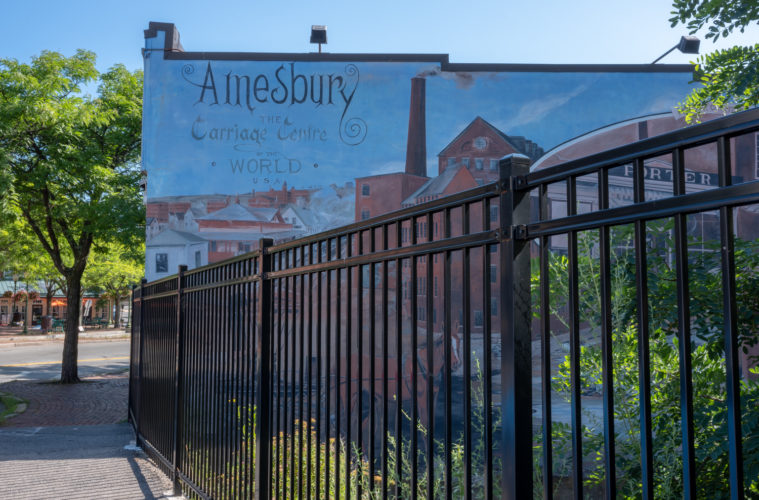“What were the actual ravages of the epidemic of influenza from which this community has been suffering?” asks the opening line of an article published in the Amesbury Daily News on October 29, 1918. This is one record that marks Amesbury’s first encounter with the Spanish flu, a situation that has been compared to today’s COVID-19 epidemic due to its abrupt and resounding impacts felt worldwide.
Much has been published in answer to the question posed over a century ago alongside restoration and rebuilding. While we may not have a clear picture yet of how—or more urgently, when—our present-day destructions will be repaired, we may be wise to ask a different question in the meantime: Can Amesbury’s past recoveries offer hope for the future?
In Sara Locke Redford’s History of Amesbury, Massachusetts, the author chronicles the influenza epidemic of 1918 and writes that in the month of September of that year, schools were closed and public meetings were cancelled in response to the outbreak in town. On September 30, “A canteen was opened on Main Street where food was gathered to distribute to families in which there was no one to prepare food because of illness … However, churches and schools reopened on the nineteenth [of October] and conditions slowly returned to normal.”
Just like Redford, Jon Almas, owner of Aeropex Media located in downtown Amesbury, also understands the importance of documenting this experience, a surreal concept considering we’re currently living through it. Initially Almas began recording footage of downtown Amesbury to show its empty streets, an odd scene on a sunny day. Eventually Almas began interviewing other business owners and town officials in the community to get their perspective on what was happening and sharing these videos on social media.
“When this all started there was a sense of uncertainty and even fear going around between myself and my friends, who are also small-business owners, and also within a lot of Facebook groups with other business owners. I’ve heard that some viewers have enjoyed getting insight from my videos into what other business owners in the same position are thinking and experiencing. Hopefully they offered a sense of everyone being in the same situation.”
Many of the small businesses that populate Amesbury’s Main Street in Almas’ videos are offering a modern-day canteen of their own; one that creates an opportunity for families and individuals to get what they need (coffee, breakfast, or a gluten-free donut) and still practice recommended social distancing. One of those businesses, Market Square Bakehouse, is feeding the neighborhood through their newly installed window service. Customers can call in their order and pick it up through the take-out window without entering the café. Owner Tanya Tzitzon says that staying open is a day-by-day decision, and one that takes into account mental as well as physical wellness.
While Tzitzon understands the importance of balancing the two, she’s had to make difficult decisions recently that diminish some of her favorite aspects of her café, such as moving the outdoor seating inside to discourage people from congregating on the corner. It’s her hope that by doing everything she can to be socially responsible and keep people feeling safe, she can continue serving the community.
“I’ve spoken to officials in town to understand how people in the community are feeling and what I’m hearing more often than not is that people still need things like food, coffee, and tea, and they feel less exposed getting take-out from a local coffee shop window than going to a large grocery store.”
Other businesses on the street have adapted, too, to accommodate recommendations made by Governor Baker and the MA Department of Health. Café Blu Dream, a coffee shop and retail store offering hemp-based products, is providing take-out and curbside delivery for their food and beverage items and free shipping for their hemp-based products.
“Part of what I do is education. There’s a big misunderstanding around hemp-derived products, so people usually come in with a ton of questions. Now I’m providing that education over the phone, via email, and continuing with my series on Instagram,” says owner Brian Bienvenu. “It’s been humbling. People are being so generous and supportive.”
Imacake bakery, owned by Jenny Ouellet, has also moved their counter service to online pre-orders only and curbside pick-up. “Initially it was scary. We actually shut our dining room down before any orders came through from the state because people were showing up and I care about my customers and didn’t want people hanging out together. We’d gone to a pick-up method only a couple weeks prior to the lockdown.”
Ouellet found an opportunity in the semi-closure by getting her online store organized and up-to-date. “One of the only complaints about my bakery is that I never have signage in the window case saying what products are and how much they cost. So now, you go online and everything is there. Everything is pre-paid, customers don’t come in the store, and they text or call and I run the food out.”
While business has carried on for some, albeit changed, plenty of others worry about surviving through the lockdown. Taylor Simpson, owner of Nest, is concerned about how these changes will impact the continuity of her business. Nest can be easily spotted on Main Street, if not for its quirky gold window shutters and tiny bird houses, then for its open door, the “oldies” music that streams from the shop into the street, and the air plants that line the shop walls.
“There’s been a lot of verbal support for small businesses, which is helpful, but at the end of the day we really need financial support. We aren’t asking for charity—we’re asking for sustainability.”
Amesbury is no stranger to being reshaped by halts and shifts in business, although its been centuries since the town has experienced anything nearly comparable to today’s dilemma. The textile industry in Amesbury, for example, was one of the biggest employers in terms of number of workers in the mid-1800s. “There were a couple textile companies that formed in Amesbury but until they had steam in the 1870s, there were moments when there wasn’t enough water for the mills to operate so that companies would just close. There was one period of time, I think it was in the 1850s, when a company was closed for three months,” says John Mayer, Executive Director of the Amesbury Carriage Museum.
Then, in 1930, local automobile companies in Amesbury closed abruptly (an industry that employed approximately 5,000 people). The town didn’t have the capital to keep up with changes happening in automobile manufacturing processes, such as were booming in Detroit, where large presses were used to stamp the automobile bodies with iron. Although many identify Amesbury as being a carriage town, it actually produced more automobiles than carriages.
“For that to go from viable ongoing work to nothing must have been a huge shock for the community and it happened right around the time of the depression,” says Mayer. “I think these instances speak to the town’s economic and human resilience.”
Almas has come to know Amesbury in this light as well. “Amesbury has always been welcoming, especially to small business owners, which is part of why I love it. I don’t think I would have had such success starting my business if I didn’t live here. It’s the perfect little town.”
While our present-day work environments differ drastically from what they used to be in the nineteenth and twentieth centuries, Mayer recognizes that businesses today have in common their determination to acclimate in such a short period of time. “One opportunity that the Amesbury Carriage Museum has now is to continue doing programming online. That’s a really different model from the direction we were going.”
Mayer admits that he worries about how much hurt will befall small businesses in Amesbury between now and the unforeseen future. But, he says, “Time will go on, there will be a new day and there will be new things happening in Amesbury.”
For one, Ouellet is looking forward to bringing back imacake’s story time. “It’s always been a free event, something to give people a place to go. I’m looking forward to letting the community back in.” A parent of two herself, she says to other parents, “It’s okay. You didn’t go to school to be a teacher; you’re a mom, or a dad, and you work hard, and if you can’t teach them exactly what their teacher in school was teaching them, it’s okay. They’re not going to suffer. Just love on your kids.”
Bienvenu can’t wait to have his window seats filled again. “I have many regulars who come in and sit and have their coffee and we’ll talk. A big part of what I do is communication and education so the human interaction part of my job is what I’m most looking forward to getting back.” Bienvenu is not alone in his prediction that the “support local” movement will be even stronger once this is all over.
Almas expects that there will be a “heightened sense of community and appreciation for the day-to-day things (and jobs) that we may have taken for granted” when this is all over, a sentiment shared by Tzitzon as well.
“There will be an end to this and community-based businesses are so essential. Stay informed as much as you can on a daily basis to make the best decision you can. I do think we’ll all come out of this at some point and people will definitely need to be around people. We can use this time to figure out what’s important.”
Editor’s note: At the time of this publication, the businesses mentioned in this article are partially open and offering curbside delivery or take-out services. This is changing on a daily basis. Follow them on social media for updates and instructions on how to safely receive their products.

